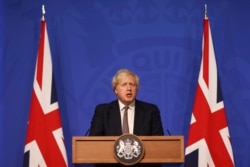The emergence of the Omicron variant has caused financial markets to swoon and national leaders to order or threaten fresh pandemic measures aimed at preventing the strain’s spread. The world appears caught in a guessing game with everyone wanting to know whether Omicron can beat the world’s current vaccines.
Vaccines and their boosters have done much to reduce transmission, serious illness and fatalities. And until effective anti-viral treatments are introduced and mass produced, vaccines are the main line of defense. Whether vaccines remain efficacious against Omicron, first identified by researchers in southern Africa, was dubbed this week by Britain’s Boris Johnson the “billion-dollar question.”
In a press conference at Downing Street, he sought to reassure an alarmed British public. “We think the chances are that the boosters will continue to give you protection of some degree against variants,” he said. But he added: “We need to check that.”
Another key question scientists are rushing to answer: Is Omicron more deadly than its forerunner dominant Delta strain?
Goldman Sachs, the American financial powerhouse, is trying to factor into its investment decisions and counsel all possible Omicron outcomes — from a worst-case scenario of greater virulence and vaccine-evasion to the nice surprise that the vaccines remain efficacious, and Omicron turns out to be more benign than its forerunner.
Are there any grounds for hoping that the latter will turn out to be true? The more optimistic voices can be hard to discern amid pessimistic forecasts and the announcements by leaders and governments of fresh pandemic measures.
Optimism
But there are some reasons for hope.
On Wednesday, an official at the World Health Organization said early indications suggest most Omicron coronavirus cases are “mild.” And the official said there’s no evidence to suggest the efficacy of vaccines has been reduced by the new strain — but cautioned there might be an increased risk of quicker transmission.
America's top infectious disease expert, Anthony Fauci, said midweek it is too early to know whether Omicron will lead to severe disease. “We do not know, and it is too early to tell,” he said. Although he offered some hope by pointing to “some preliminary information from South Africa” suggesting Omicron prompted “no unusual symptoms.”
Some officials and scientists remain more upbeat than Fauci is, and more optimistic than the CEO of Moderna, the maker of one of the coronavirus vaccines, who sent financial markets plummeting this week with a gloomy interview with Britain’s Financial Times newspaper. “This is not going to be good,” Stéphane Bancel said, adding he fully expected a significant fall-off in the vaccines’ effectiveness.
But Ugur Sahin, the CEO of BioNTech, which developed, with Pfizer, one of the world's most widely used jabs, remains highly confident. “To my mind there's no reason to be particularly worried. The only thing that worries me at the moment is the fact that there are people that have not been vaccinated at all,” he told The Wall Street Journal Tuesday.
He urged people not to “freak out,” saying he remained confident the Pfizer vaccine will likely continue to offer strong protection against any severe disease from Omicron. “Our belief is rooted in science: If a virus achieves immune escape, it achieves it against antibodies, but there is the second level of immune response that protects from severe disease—the T-cells. Even as an escape variant, the virus will hardly be able to completely evade the T-cells,” he said.
He added the caveat that the high number of mutations on the protein spike the virus uses to penetrate human cells might mean vaccines need to be modified to improve their effectiveness.
BioNTech is working on an upgraded version of its original vaccine.
Israeli health minister Nitzan Horowitz added a dose of optimism, too, on Tuesday, reporting early laboratory indications suggest that people who are fully vaccinated, especially those who have been boosted, are also protected against the Omicron variant.
“In the coming days we will have more accurate information about the efficacy of the vaccine against Omicron, but there is already room for optimism, and there are initial indications that those who are vaccinated with a vaccine still valid or with a booster will also be protected from this variant,” she said.
“The vaccine is really crucial right now. Anyone who is exposed to the variant without a vaccine will put themselves at unnecessary risk,” she added.
Other optimists point to the comments made by a South African doctor, who was one of the first to suspect a different coronavirus strain was spreading among her patients. She told reporters Sunday that the symptoms of the Omicron variant she had seen were so far mild and could be treated at home.
Dr. Angelique Coetzee, chair of the South African Medical Association, told Reuters she noticed seven patients at her clinic on November 18 had symptoms different from the dominant Delta variant.
The patients complained only of extreme fatigue.






